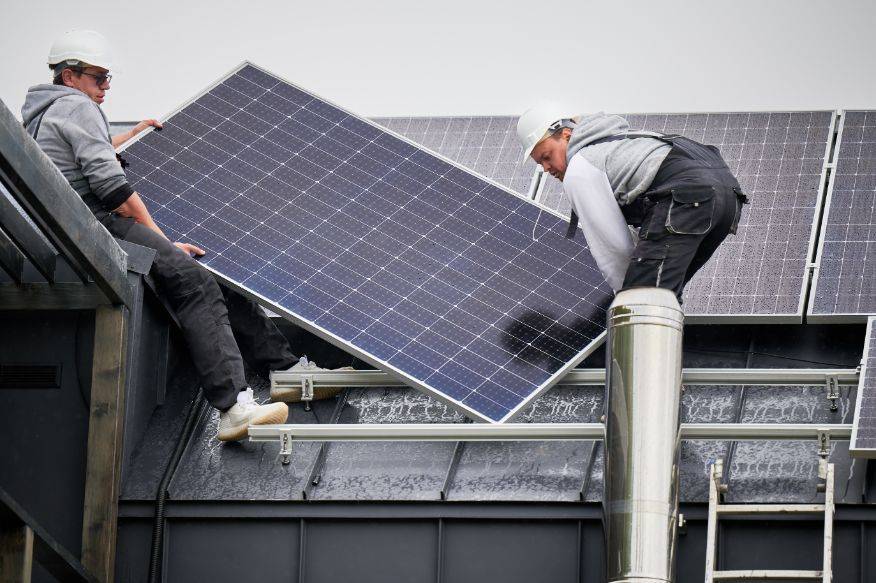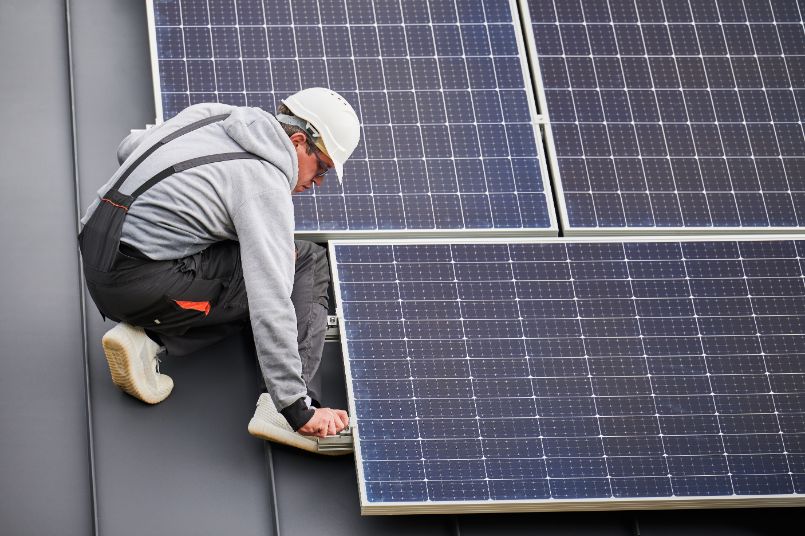How Do I Choose The Best Solar Panels?
Choosing solar panels can be a daunting task, but there are a few key factors to consider that can help make the decision easier. Here are some tips on how to choose a solar module:
- Consider The Cost
- Check The Company’s Reviews And History
- Determine Your Energy Consumption Patterns
- Panel Type
- Brand And Quality
- Certifications
- Price Comparison
- Brand Warranties
Consider The Cost

When it comes to venturing into the world of solar energy, selecting the right solar module for your needs is a pivotal decision. While the cost is undeniably a critical factor, it should not stand alone in your considerations. A successful solar panel investment involves a delicate balance between cost, efficiency, quality, and long-term value. In this comprehensive guide, we’ll delve deep into the details to ensure that you make an informed choice—one that not only saves you money but also aligns with your energy needs and environmental aspirations.
Understanding The Significance Of Cost In Solar Modules
The cost of a solar module is a crucial aspect of your solar energy journey. However, it’s vital to recognize that cost, while essential, should not be the sole determining factor. A holistic evaluation takes into account various facets to ensure you’re not just getting a good deal but a quality investment.
Efficiency And Cost
The allure of a bargain is undeniable, but it’s vital to resist the temptation of the cheapest solar panel on the market. While low-cost options may appear enticing at first glance, they often come with a trade-off in terms of efficiency and long-term performance. Choosing a solar module based solely on upfront cost can lead to suboptimal energy production and potentially greater expenses down the road.
Solar panel efficiency, a critical metric, measures how effectively a panel converts sunlight into electricity. Panels with higher efficiency generate more electricity for a given surface area. Although they may carry a higher price tag, their ability to produce more power can translate into significant long-term benefits.
To strike the right balance, consider your unique circumstances. If you have ample space for solar panels and are not constrained by area limitations, you might opt for slightly less efficient, more budget-friendly panels without compromising overall system performance. On the other hand, if space is at a premium or you aim to maximize energy generation, investing in high-efficiency panels can be a prudent choice.
Solar Module Supplier Selection
Choosing a reputable solar panel supplier is a pivotal step in ensuring the success of your solar project. As you embark on this journey, take the time to scrutinize the reputation and track record of the companies vying for your business. Since investing in a solar panel system represents a substantial commitment, it’s wise to conduct research and gather insights from past clients to gauge the performance of both the product and the supplier’s customer service.
- Longevity and Industry Standing: The duration a company has spent in the industry can be indicative of its reliability. While newer entrants may offer innovative solutions, established companies often possess a wealth of experience and a more comprehensive understanding of solar technology. Industry standing is another essential indicator—companies with a respected presence are more likely to provide quality products and support.
- References and Testimonials: Don’t hesitate to request references from potential solar module suppliers. Speaking directly with past clients can provide you with real-world insights into the company’s performance and the quality of its products. A satisfied customer base is often a strong indicator of trustworthiness.
Beyond The Panel
It’s crucial to acknowledge that the cost of a solar panel is just one piece of the puzzle. The holistic cost of your solar system encompasses not only the modules themselves but also installation and long-term maintenance. Failing to consider these aspects can lead to unexpected financial burdens down the line.
- Installation Costs: The installation of your solar panels involves a complex set of tasks beyond merely attaching them to your roof or property. Inverters, racking systems, and the necessary wiring are integral components that contribute to the overall cost. The complexity of your installation, as well as any upgrades required for your electrical system, can significantly influence the total installation cost.
- Maintenance and Repairs: While solar panels are engineered for durability and low maintenance, they are not entirely maintenance-free. Accumulated dirt, dust, and debris can reduce efficiency over time, necessitating periodic cleaning and inspection. Additionally, it’s crucial to familiarize yourself with the warranty coverage of your panels, as some may come with longer and more comprehensive warranties than others. This can play a pivotal role in safeguarding your investment against unexpected maintenance or replacement costs.
- Durability and Longevity: Assess the durability and longevity of the solar panels you’re evaluating. Panels designed to withstand harsh environmental conditions, such as hail or extreme temperatures, may come with a higher initial cost but can save you money in the long run by minimizing the risk of damage and the need for costly repairs or replacements.
The Value Proposition
To make an informed decision, it’s imperative to compare offers from various solar panel suppliers comprehensively. While price is a crucial factor, it should not be the sole determining criterion. The overall value proposition should take into account not only the cost but also the quality of the product and the level of customer service provided by the supplier.
- Quotes and Proposals: Seek quotes and proposals from multiple solar panel suppliers within your region. These should provide detailed information about the panels they recommend, the installation process, and the total cost of your solar system. By comparing these proposals side by side, you can gain a holistic understanding of the offerings available.
- Technical Specifications: Delve into the technical specifications of the solar panels under consideration. Analyze factors such as efficiency, dimensions, and durability. Ensure that the panels align with your specific needs and requirements, and verify that they meet or exceed industry standards.
- Customer Reviews and References: Investigate customer reviews and request references from previous clients of the solar panel suppliers you are considering. Hearing firsthand about the experiences of others can offer valuable insights into both the quality of the product and the level of service provided by the supplier.
- Installer Expertise: Assess the expertise and qualifications of the solar panel installers affiliated with each supplier. The skill and experience of the installer can significantly impact the performance and longevity of your solar system. Opting for an installer with a proven track record can be a wise choice.
- Long-Term Benefits: Consider the long-term benefits associated with each offer. Calculate potential energy savings over the lifespan of your solar panels, factoring in their efficiency, warranty coverage, and maintenance requirements. It’s essential to recognize that a higher upfront investment may result in greater savings and returns over time.
Environmental And Climatic Considerations
Your local climate and environmental conditions play a pivotal role in determining the most suitable solar panels for your specific needs. Solar panels can exhibit varying performance in different climates and environments, making it imperative to choose panels that align with the conditions in your region.
- Climate Considerations: Take into account the typical weather patterns in your area. Some solar panels are better suited for high-temperature environments, while others excel in low-light or cloudy conditions. Select panels that can perform optimally in your local climate to maximize energy production throughout the year.
- Environmental Impact: If environmental sustainability and minimizing your carbon footprint are top priorities, consider solar panels that are manufactured using eco-friendly materials and processes. Some manufacturers place a strong emphasis on sustainability, and their products may align closely with your values.
Aesthetics
Solar panels are available in a myriad of colors and designs, offering the flexibility to integrate them seamlessly into your property’s aesthetics. If the visual impact of your solar installation is a concern, explore options that blend harmoniously with your roof or surroundings.
- Color and Design: While traditional solar panels are typically dark blue or black, newer options offer a broader range of colors and designs. You can now choose panels that complement your roof or property’s appearance, ensuring that your solar installation doesn’t compromise the visual appeal of your home.
Check The Company’s Reviews And History

When embarking on the journey to select a solar module supplier, a crucial step is to thoroughly investigate the company’s reviews and history. This diligent research allows you to gauge the experiences of previous customers, and the company’s longevity, reputation, values, and financial stability. By delving into these specific details, you can make an informed decision that not only ensures the reliability of the solar module but also the quality of customer service you receive.
Reviews
A wealth of information lies in customer reviews of the solar panel supplier you are considering. Reviews can be found on various platforms, including the company’s website, social media channels, and dedicated review websites. This treasure trove of insights provides valuable perspectives on the product, customer service, and whether the company fulfills its promises.
- Customer Satisfaction: One of the primary aspects to assess in reviews is customer satisfaction. Look for patterns in feedback to determine whether clients are content with their solar panel purchase. Positive reviews often highlight seamless installations, reliable product performance, and responsive customer service.
- Product Performance: Customer reviews can shed light on the performance and durability of the solar panels. Are customers reporting consistent energy generation? Are there any recurring issues or defects? This information can help you anticipate the longevity and reliability of the panels.
- Customer Service Experience: Assess how the solar panel supplier handles customer inquiries, concerns, and issues. Exceptional customer service is often reflected in reviews, as satisfied customers share their positive interactions with the company. Prompt responses, knowledgeable support, and effective issue resolution are hallmarks of top-notch customer service.
- Promises Delivered: Scrutinize reviews for instances where customers mention whether the company delivered on its promises. Did the installation process align with what was initially discussed? Were the panels and components of the expected quality? A track record of keeping promises is a strong indicator of a reliable supplier.
Company History
A solar panel supplier’s history is a crucial facet of its reliability and reputation. Examining the company’s tenure in the industry and its standing within it can provide valuable insights into its track record and commitment to providing quality products and services.
- Years in Business: Consider how long the solar panel supplier has been in operation. While newer entrants can offer innovative solutions, established companies often possess the experience and expertise garnered over years of operation. A company with a substantial history is more likely to have refined its product offerings and customer service.
- Reputation in the Industry: Beyond longevity, assess the supplier’s reputation within the solar industry. Companies that are well-regarded by peers and industry experts often demonstrate a commitment to excellence. Awards, certifications, and recognition within the industry can be indicative of a company’s dedication to quality.
- Track Record: Investigate the company’s track record by examining its history of product recalls, safety concerns, or legal issues. A supplier with a clean track record is more likely to provide reliable and safe products.
Warranty
A warranty is a critical component of your solar module investment, offering assurance that the supplier stands behind its product. When considering a solar module supplier, look for one that offers a warranty of at least 10 years, if not more. A robust warranty ensures that you have a reliable product that is built to last.
- Warranty Duration: The duration of a warranty is a significant factor. Longer warranties, often extending to 25 years or more, can be indicative of the supplier’s confidence in the durability and performance of its solar panels. These warranties typically come in two forms: a performance warranty and a product warranty.
- Performance Warranty: This aspect of the warranty guarantees a certain level of energy production over time. For example, a common performance warranty might ensure that the solar panels will operate at 80% efficiency after 25 years. Understanding the specifics of the performance warranty helps you assess the long-term value of the panels.
- Product Warranty: The product warranty covers defects in materials and workmanship. In the event that your solar panels suffer from manufacturing defects or fail prematurely, the product warranty ensures that you are protected. Ensure that the warranty terms are clear and comprehensive, as this safeguards your investment against unexpected issues.
Values and Mission
Beyond the technical and financial aspects, consider the values and mission of the solar module supplier. A company’s values and mission can reveal its commitment to sustainability, environmental responsibility, and social impact. Selecting a supplier that aligns with your values can enhance the satisfaction of your solar panel investment.
- Environmental Stewardship: Investigate whether the company prioritizes environmentally friendly practices and sustainable manufacturing processes. Companies that emphasize reducing their carbon footprint in production and operations may align more closely with your environmental values.
- Social Responsibility: Some solar panel suppliers actively engage in initiatives that benefit local communities or support charitable causes. Understanding a company’s social responsibility efforts can help you determine if its mission resonates with your own philanthropic values.
Financial Stability
The financial stability of a solar panel supplier is a factor often overlooked but of paramount importance. A financially stable company is more likely to endure over the long term and provide reliable customer service and support. To assess financial stability:
- Financial Statements: Review the company’s financial statements, which are typically publicly available. These statements can offer insights into the company’s revenue, profitability, and overall financial health.
- Growth Trajectory: Analyze the company’s growth trajectory over the past few years. Steady growth can indicate a healthy and stable business, while erratic or declining growth may raise concerns.
- Industry Position: Consider the supplier’s position within the solar industry. Are they expanding, diversifying, or acquiring other businesses? A company with a strong presence and strategic initiatives is more likely to remain a dependable partner for years to come.
Determine Your Energy Consumption Patterns

Understanding your energy consumption patterns is a critical step in the process of transitioning to solar power. By thoroughly analyzing your electricity bills and assessing your energy needs, you can determine the size, type, and configuration of a solar panel system that best suits your home. In this comprehensive guide, we’ll explore the specific details to consider when evaluating your energy consumption patterns and making informed decisions about your solar module selection.
Analyzing Your Monthly Energy Usage
To embark on your solar energy journey, start by closely examining your electricity bills. This provides valuable insights into how much electricity you use on a monthly basis, which serves as a foundational piece of information for designing your solar panel system.
- Monthly Consumption: Look at your energy bills to determine your monthly electricity consumption in kilowatt-hours (kWh). This figure represents the total amount of electricity your household consumes each month. Understanding this baseline is essential for sizing your solar panel system appropriately.
- Seasonal Variations: Pay attention to seasonal variations in your energy consumption. Energy usage tends to fluctuate throughout the year, with higher demand during peak summer or winter months. Identifying these patterns will help you determine the system’s size and whether additional considerations, such as battery storage, are necessary to meet your needs year-round.
Yearly Energy Consumption Analysis
While examining monthly consumption is essential, delving deeper into yearly energy consumption patterns provides a more comprehensive understanding of your energy needs. This analysis allows you to account for seasonal variations and plan accordingly.
- Annual Energy Usage: Calculate your yearly energy usage by summing up the total kilowatt-hours consumed over a year. This annual figure offers a more accurate representation of your energy needs, considering fluctuations in weather and seasonal activities.
- Peak Demand Periods: Identify peak demand periods during the year when your energy consumption is at its highest. This information helps determine the solar panel system’s capacity to meet your peak energy demands.
Roof Space and Solar Panel Orientation
The physical characteristics of your property, such as roof space and solar panel orientation, play a pivotal role in determining the feasibility and efficiency of your solar panel installation.
- Roof Space: Assess the available roof space for your solar panel system. Consider factors like shading, obstructions, and roof condition. Solar panels are typically installed on south-facing or west-facing rooftops to maximize exposure to sunlight. Determine how many panels can fit comfortably on your roof while accounting for any obstructions like chimneys or vents.
- Orientation: Determine the optimal orientation for your solar panels. South-facing panels generally receive the most sunlight throughout the day, but west-facing panels can capture afternoon sun. Discuss with a solar professional to identify the best orientation based on your location and energy consumption patterns.
- Shading: Take into account any nearby trees or structures that cast shadows on your roof during the day. Shading can significantly impact the efficiency of your solar panels. Consider trimming or removing trees that obstruct sunlight if feasible.
Professional Solar Site Evaluation
While a self-assessment of your energy consumption patterns and property characteristics is valuable, seeking a professional opinion can provide a more accurate and tailored solar solution. A solar site evaluation involves a trained technician visiting your property to assess various factors, including:
- Roof Condition: A thorough inspection of your roof’s condition to ensure it can support solar panel installation without issues.
- Shading Analysis: Detailed shading analysis to identify potential obstructions and their impact on solar panel efficiency.
- Orientation Assessment: Precise measurement and evaluation of the best orientation for your solar panels based on your location.
- System Size Recommendation: A professional can recommend the optimal size and type of solar panel system to meet your energy consumption patterns.
- Incentive and Rebate Information: Guidance on available incentives, rebates, and tax credits that can help offset the cost of your solar installation.
Aligning Your Solar Module Selection with Your Needs
With a comprehensive understanding of your energy consumption patterns and property characteristics, you can now make informed decisions about your solar module selection.
- Choosing the Right Module: Based on your energy needs and available space, select solar modules that align with your requirements. Consider factors like module efficiency, durability, and warranty coverage.
- Type of Solar Panels: Decide between different types of solar panels, such as monocrystalline, polycrystalline, or thin-film. Each type has its advantages and suitability for specific situations.
- Battery Storage: Assess whether adding battery storage to your solar panel system is necessary to store excess energy for use during nighttime or cloudy days.
- Professional Consultation: Consult with a solar professional to fine-tune your solar module selection. They can recommend specific brands and models that align with your needs and budget.
Panel Type
When it comes to harnessing solar energy through photovoltaic panels, there are two primary types of panel technology that dominate the market: monocrystalline and polycrystalline. Each of these technologies has its unique characteristics, advantages, and limitations. In this comprehensive guide, we’ll delve deep into the specifics of monocrystalline and polycrystalline solar panels, shedding light on the factors to consider when choosing between them for your solar energy system.
Monocrystalline Solar Panels: Efficiency and Elegance
Monocrystalline solar panels are renowned for their exceptional efficiency and elegant appearance. They are crafted from a single crystal structure of silicon, resulting in several distinguishing features.
- Efficiency: Monocrystalline panels boast a higher efficiency rating compared to their polycrystalline counterparts. This means they can convert a larger percentage of sunlight into electricity. Greater efficiency translates to more power generation for a given surface area, making monocrystalline panels particularly suitable for situations with limited roof space.
- Space Efficiency: Due to their higher efficiency, monocrystalline panels require less space to produce the same amount of electricity as polycrystalline panels. This characteristic is advantageous for homeowners with smaller roofs or those looking to maximize energy production within a confined area.
- Aesthetics: Monocrystalline panels often have a sleek black or dark blue color, which is considered more visually appealing by many homeowners. Their uniform appearance can enhance the overall look of your solar installation, making it an attractive choice for those who prioritize aesthetics.
- Durability: Monocrystalline panels are typically more durable and longer-lasting due to their single-crystal structure. This structural integrity contributes to their ability to withstand various weather conditions and maintain performance over an extended period.
- Price: However, it’s essential to note that the efficiency and elegance of monocrystalline panels come at a premium. They tend to be more expensive than polycrystalline panels, which can impact the upfront cost of your solar system.
Polycrystalline Solar Panels: Cost-Efficient and Reliable
Polycrystalline solar panels, also known as multi-crystalline panels, are known for their cost-effectiveness and reliability. These panels are crafted from multiple crystals of silicon, offering a slightly different set of attributes.
- Efficiency: Polycrystalline panels are generally less efficient than monocrystalline panels. They convert sunlight into electricity at a lower rate, which means you’ll need more panel surface area to generate the same amount of power. However, this reduced efficiency doesn’t necessarily translate into significantly lower performance in all scenarios.
- Cost-Effectiveness: One of the primary advantages of polycrystalline panels is their cost-effectiveness. They are typically more budget-friendly than monocrystalline panels, making solar energy more accessible to a broader range of homeowners.
- Lighter Color: Polycrystalline panels often have a lighter blue color compared to the darker hues of monocrystalline panels. The visual contrast may appeal to those who prefer a brighter aesthetic for their solar installation.
- Space Considerations: Due to their lower efficiency, polycrystalline panels may require more space for installation compared to monocrystalline panels. Homeowners with ample roof space or ground space may find this to be a practical and cost-effective choice.
- Reliability: Polycrystalline panels are known for their reliability and durability. While their efficiency may be slightly lower, they can withstand various environmental conditions and continue to perform consistently over time.
Making The Right Choice: Factors to Consider
Choosing between monocrystalline and polycrystalline solar panels involves a careful assessment of your specific needs, preferences, and constraints. Here are some factors to consider:
- Roof Space: Evaluate the available space on your roof. If you have limited space, monocrystalline panels may be the preferred choice due to their higher efficiency and space efficiency.
- Budget: Consider your budget for the solar panel system. If cost-effectiveness is a primary concern, polycrystalline panels may be the more suitable option.
- Energy Production Goals: Determine your energy production goals. If you aim to maximize energy generation and have limited space, monocrystalline panels are a logical choice. However, if you have ample space and prioritize cost savings, polycrystalline panels can still meet your needs.
- Aesthetic Preferences: Take into account your aesthetic preferences. Monocrystalline panels are often favored for their sleek appearance, while polycrystalline panels have a lighter, more traditional look.
- Location and Climate: Consider your geographical location and local climate. Your solar panel choice should align with the amount of sunlight your region receives and the environmental conditions it experiences.
Other Solar Panel Technologies
While monocrystalline and polycrystalline panels dominate the market, it’s worth noting that there are other solar panel technologies, albeit less common. Two notable options include thin-film and bifacial panels:
- Thin-Film Panels: Thin-film panels are lightweight and flexible, making them suitable for unconventional installations. They have lower efficiency compared to crystalline panels but excel in certain applications like building-integrated photovoltaics (BIPV).
- Bifacial Panels: Bifacial panels can capture sunlight from both the front and back sides, potentially increasing energy production. They are often used in ground-mounted installations to maximize energy yield.
Brand And Quality

When it comes to selecting a solar module for your renewable energy journey, the brand and quality of the product are paramount considerations. Solar panels represent a significant investment, one that is expected to provide reliable energy generation for many years. To ensure you make an informed decision and maximize the longevity and performance of your solar panel system, it’s crucial to delve into the specifics of brand reputation, product quality, warranty coverage, customer service, alignment with your values, and financial stability.
Brand Reputation and Longevity
The brand you choose for your solar module carries significant weight in determining the reliability and performance of your solar panel system. Here are key factors to consider:
- Reputation: Seek out reputable brands that have established themselves as leaders in the solar industry. A brand’s reputation is built on years of consistent performance, quality products, and customer satisfaction. Reputation is often a reflection of a company’s commitment to excellence.
- Longevity: Consider how long the brand has been in business. Solar panel manufacturers with a track record of several years or more are more likely to provide reliable products. Longevity also speaks to a company’s ability to adapt to changing technologies and industry standards.
- Warranty Coverage: Look for brands that offer robust warranty coverage. A warranty of at least 10 years is a strong indicator of a manufacturer’s confidence in the durability of their solar panels. Comprehensive warranties can provide peace of mind, protecting your investment against unexpected issues.
Customer Feedback And Company History
One of the most valuable resources when evaluating a solar module brand is the experiences and feedback of previous customers. Here’s what to consider:
- Customer Reviews: Investigate customer reviews and testimonials. These firsthand accounts provide insights into the real-world performance of solar panels and the level of satisfaction among users. Positive reviews often highlight efficient energy production and reliable products.
- Company History: Scrutinize the history of the solar module manufacturer. Delve into the company’s background, milestones, and achievements. Companies with a storied history often possess valuable industry knowledge and expertise.
- Industry Recognition: Explore any industry awards, certifications, or recognition the brand has received. These accolades can be indicative of a company’s dedication to quality and innovation.
Values And Mission Alignment
Beyond technical specifications, consider whether the brand’s values and mission align with your own. A company’s commitment to sustainability, environmental responsibility, and social impact can play a crucial role in your decision-making process:
- Environmental Responsibility: Investigate whether the company prioritizes environmentally friendly practices in its manufacturing processes. Brands that emphasize reducing their carbon footprint and minimizing waste contribute to a more sustainable future.
- Social Impact: Some solar module manufacturers actively engage in initiatives that benefit local communities or support charitable causes. Understanding a brand’s social responsibility efforts can help you determine if its mission resonates with your own values.
The Power Of Brand Loyalty
Brands in the solar industry are more than just names on a product—they represent a promise of the experience you will have. Successful brands cultivate brand loyalty by consistently delivering on their promises and creating positive associations with their products. Customers often rely on established brands as a mark of quality and reliability.
Certifications

UL listing and IEC certifications play pivotal roles in ensuring the safety and quality of solar modules, making them vital factors to consider when selecting solar panels for your renewable energy system. These certifications offer assurance that the product has undergone rigorous testing and complies with internationally recognized safety standards. In this comprehensive guide, we’ll delve into the specifics of UL listing, IEC certifications, and the importance of these certifications in the context of solar module selection.
UL Listing: Ensuring Product Safety
UL, or Underwriters Laboratories, is a globally renowned safety certification organization that evaluates and certifies various products for safety and quality. When a solar module is UL-listed, it means that the product has undergone rigorous testing and adheres to UL’s applicable safety standards. Here’s what you need to know:
- Global Recognition: UL is recognized worldwide for its commitment to product safety. UL-listed products are trusted across borders, reflecting a dedication to the highest safety standards.
- Comprehensive Testing: UL conducts comprehensive testing, including electrical and fire safety evaluations, to ensure that solar modules are safe for use. This testing encompasses various factors, such as insulation, current-carrying capacity, and resistance to environmental conditions.
- Stringent Requirements: UL certification requirements are stringent, encompassing both the safety of the product itself and its application. UL-listed solar modules have met these demanding criteria, assuring users of their reliability and safety.
IEC Certifications: International Standards for Safety
The International Electrotechnical Commission (IEC) is a global organization dedicated to developing and publishing international standards for electrical and electronic technologies. IEC certifications are based on minimum safety requirements for devices, including solar modules. Here’s why IEC certifications are crucial:
- Global Standardization: IEC certifications provide a framework for standardizing product safety on a global scale. These certifications ensure that solar modules meet minimum safety requirements, making them suitable for international markets.
- Minimum Safety Criteria: IEC certifications establish baseline safety criteria that solar modules must meet to protect users from potential hazards. These criteria encompass aspects such as electrical insulation, component integrity, and resistance to environmental stressors.
- Global Acceptance: IEC certifications are widely accepted and recognized across countries, simplifying the process of ensuring solar modules’ safety and quality when they are used internationally.
Dual Certification For Safety Assurance
When choosing a solar module for your renewable energy system, it’s advisable to select a product that holds both UL listing and IEC certifications. This dual certification approach offers multiple layers of assurance regarding safety and quality. By doing so, you can be confident that the product meets stringent safety standards not only within your local jurisdiction but also on a global scale.
Country-Specific Certification Considerations
While UL listing and IEC certifications are widely recognized, it’s essential to be aware that some countries have their own certification standards and requirements. When evaluating solar modules, check if the product has been certified for use in your specific country or region. Compliance with local regulations ensures that the solar modules are suitable for installation and operation in your area.
TÜV SÜD: An Additional Certification Authority
In addition to UL and IEC, TÜV SÜD is another prominent global certification organization that can evaluate and certify products for safety compliance. TÜV SÜD tests and certifies products to various safety certification requirements, including UL, CSA (Canadian Standards Association), IEC, and more. Choosing solar modules with TÜV SÜD certification can provide an extra layer of confidence in the product’s safety and quality.
UL vs. IEC Standards: A Comparative Insight
UL standards and IEC standards serve the same fundamental purpose: ensuring product safety. However, they have distinct characteristics:
- UL Standards: UL standards are often more comprehensive in terms of product safety and application. They encompass a wide range of safety aspects, including electrical performance, fire resistance, and environmental durability. UL standards may also incorporate the corresponding IEC or ISO text. However, it’s important to note that the price of UL standards reflects the costs associated with securing the copyright for the IEC or ISO text in the United States.
- IEC Standards: IEC standards, on the other hand, specify minimum safety requirements for devices. While they set essential safety criteria, they may not cover the same breadth of factors as UL standards. IEC standards provide a foundation of safety but may not address all specific considerations of every application.
The Importance of Brand Reputation
In addition to certifications, the reputation of the brand is a critical factor in choosing a solar module. Reputable brands are committed to adhering to safety standards, providing quality products, and delivering excellent customer support. A well-established brand with a history of reliability and customer satisfaction can offer an additional layer of confidence in the product’s performance and safety.
Price Comparison

Compare prices from different solar panel suppliers to see which one offers the best value for your money. Don’t just look at the price, but also consider the quality of the product and the customer service provided by the supplier. Here are some specific details to consider:
There are many different polycrystalline solar panels available, and the price can vary depending on the brand, size, and other factors. Here are some of the details:
- According to EcoWatch, polycrystalline solar panels are more affordable than monocrystalline panels. The price difference between the two types of panels varies depending on the exact solar panel models being compared. However, in general, the price difference is comparable to the efficiency difference — monocrystalline panels are around 20% more efficient, but also more expensive.
- MarketWatch states that monocrystalline panels cost more than polycrystalline panels but provide higher efficiency and better performance in extreme temperatures. They also have a more uniform appearance.
- Forbes states that the average cost of monocrystalline solar panels ranges from $1 to $1.50 per watt, while the cost of polycrystalline solar panels is slightly lower.
- CNET states that monocrystalline panels are more expensive than polycrystalline panels, but they are also more efficient.
Brand Warranties

Brand warranties are agreements between manufacturers and consumers that specify the terms and conditions of warranty coverage. When considering solar modules, it’s crucial to understand the specifics of brand warranties. Here are key points to consider:
Coverage Duration
Brand warranties can vary in duration, depending on the manufacturer and product. Some may offer limited lifetime warranties, while others provide coverage for a set number of years.
Coverage Details
Read the warranty terms and conditions carefully to comprehend what’s included and excluded. Some warranties may have limitations or exclusions that are important to be aware of.
Activation Requirements
To activate your warranty, you may need to register it. Typically, this can be done online or via mail.
Proof Of Purchase
Some manufacturers may require proof of purchase to honor the warranty. It’s advisable to retain your receipt or invoice.
Peace Of Mind
Brand warranties provide peace of mind, assuring consumers of product quality and manufacturer support.
Selection Consideration
When choosing a solar module, consider the brand warranty alongside pricing and other factors. Opt for reputable brands with warranties of at least 10 years for reliability and longevity.
Choosing the best solar panels for your project can be a daunting task, but with the right information, you can make an informed decision. By considering factors such as cost, panel type, brand warranties, and certifications, you can choose a solar module that meets your energy needs and budget. It’s also important to research solar panel suppliers and read reviews from other customers to ensure that you are purchasing a reliable product from a reputable brand. We can offer you solar panels and can help you find the perfect solution for your renewable energy system. Contact us today to learn more and start your journey towards a more sustainable future.


